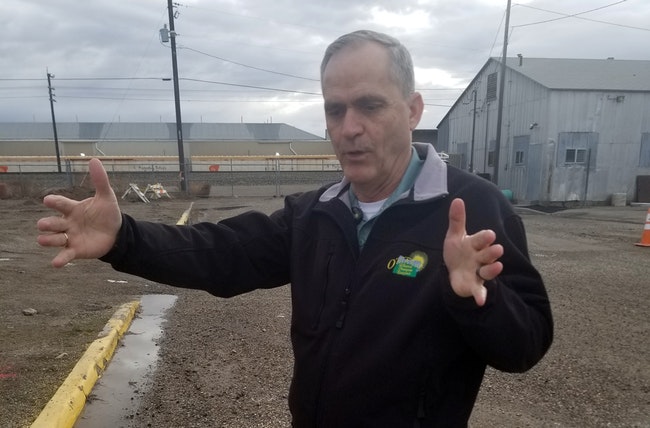 Dan Cummings. (The Enterprise/Pat Caldwell)
Dan Cummings. (The Enterprise/Pat Caldwell)
ONTARIO – The project to install tiny homes for the area’s homeless will move forward after a decision by a Malheur County Circuit Court judge last week.
Circuit Judge Lung Hung on Feb. 4 denied a temporary injunction sought by Nichols Accounting Group, a firm that operates adjacent to the area slated for the tiny homes in northeast Ontario.
The firm, at 230 N. Oregon St., and a second company, North Oregon Properties LLC, sued the city of Ontario, Origins Faith Community Church and Community in Action to stop the project. They requested the judge stop any work on the project until the lawsuit was resolved.
[ KEEP YOUR LOCAL NEWS STRONG – SUBSCRIBE ]
In its lawsuit filed Jan. 16, the firms contended the shed-like homes would violate the city’s and zoning ordinances and create a sanitation and health issue.
Tuesday’s hour-long hearing on the preliminary injunction covered much of the same ground as the lawsuit.
Vale attorney Dustin Martinsen presented arguments for The Nichols Accounting Group and North Oregon Properties LLC, while Larry Sullivan, Ontario city attorney, offered rebuttal testimony for Ontario. Portland attorney Jacob Goldberg represented Origins Faith Community Church and Community in Action during the hearing.
Martinsen told the judge he should grant the injunction because the tiny homes wouldn’t have plumbing and the site where the project is planned is not zoned for homes.
“If these tiny homes are allowed to be constructed without sewage facilities a health and safety issue will arise,” Martinsen said.
Tiny homes with no plumbing also violate the city building code, said Martinsen.
The tiny home plan also defies city zoning mandates, said Martinsen.
“The zoning code also has a plumbing requirement,” said Martinsen.
Sullivan told Hung that the request for a temporary injunction “presumes the city has not gone through the procedural steps.”
“The city has followed the requirements under the city code,” said Sullivan. “The city code does not prohibit this project from going forward.”
Sullivan asked the court to recognize that the tiny home project would be temporary, the city will evaluate the program after it ends and that The Nichols Accounting Group has been an “active participant” in the planning.
Sullivan said the tiny homes would have access to water and there will be portable toilets.
“There is no reason to believe the absence of a permanent sewer system will have a negative impact on the neighbor’s property,” Sullivan told the court.
If there are negative impacts from the project, Sullivan said the city would evaluate them and The Nichols Accounting Group “will have a seat at the table during the evaluation.”
Goldberg told the court that The Nichols Accounting Group “has to show their specific rights are violated.”
“They can’t yet make that showing,” said Goldberg.
Goldberg also wrote that the tiny home plan “has already gone through a lengthy approval process, which included notice to and input from the plaintiffs and other members of the community.”
Hung ruled that Nichols Accounting didn’t prove that the tiny homes would create irrevocable harm because of sanitation and health issues.
The city zoning ordinances, he said, allow for variances and it was up to the plaintiffs to prove they were entitled to relief and they hadn’t. He also said the fact the tiny homes are temporary, rather than permanent structures, played a part in his decision.
“To get a preliminary injunction the plaintiffs had to prove that if the injunction is not granted that the person requesting it will suffer harm. What I heard judge Hung saying was that there wasn’t any independent proof of that presented at the hearing,” said Sullivan.
The tiny home project will go ahead under current plans to begin placing the structures at the northeast Ontario site.
“I am glad the project will be able to go forward,” said Sullivan.
Adam Brown, Ontario city manager, said he did “not have a strong reaction to the decision, because I don’t want this project to be a win-loss.”
“I don’t want Nichols to lose so that the homeless can win. I’m hoping it can be a win-win. It gets framed as a net zero outcome, but my hope is that there are positive changes for everybody,” said Brown.
Barb Higinbotham, executive director of Community in Action, said her organization hoped to have some tiny homes ready for placement this week. Higinbotham said Community in Action has 15 people on a waiting list for the tiny homes. Doug Lamm, a certified public accountant with The Nichols Accounting Group, said he wasn’t surprised by Hung’s decision.
“But I am disappointed,” said Lamm. “It is what it is.”
Lamm said he isn’t sure what the next step will be. However, he said there is a “silver lining” in the entire homeless discussion.
“The biggest positive is the public is now aware and engaged and wants to find a solution. It is now being talked about and people want to find a solution that works for all the affected parties,” said Lamm.
The tiny home plan is a collaborative effort between the city, Community in Action and Origins Faith and began more than three months ago as a way to provide temporary shelter for the city’s growing homeless population. The 20 tiny homes – considered a pilot project by city officials – would be placed between Northeast Fourth Avenue and Northeast Third Avenue.
Have a news tip? Contact reporter Pat Caldwell at pat@malheurenterprise or 541-473-3377.
For the latest news, follow the Enterprise on Facebook and Twitter.
SUBSCRIBE TO HELP PRODUCE VITAL REPORTING — For $5 a month, you get breaking news alerts, emailed newsletters and around-the-clock access to our stories. We depend on subscribers to pay for in-depth, accurate news produced by a professional and highly trained staff. Help us grow and get better with your subscription. Sign up HERE.




